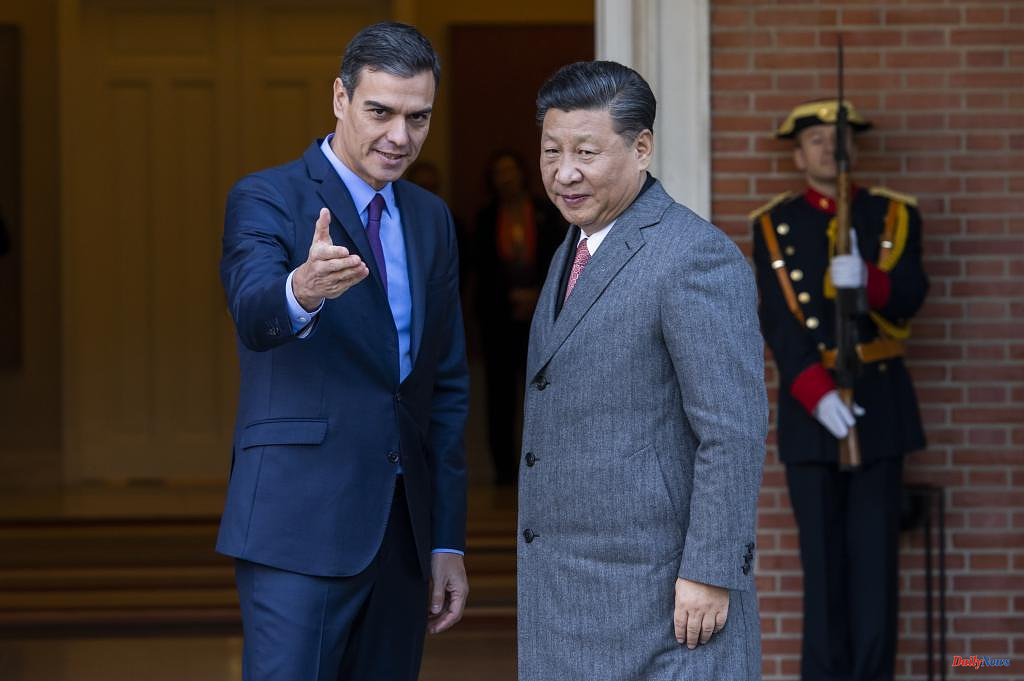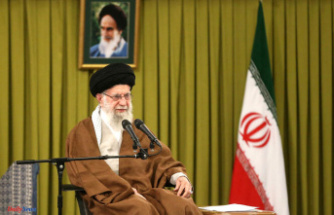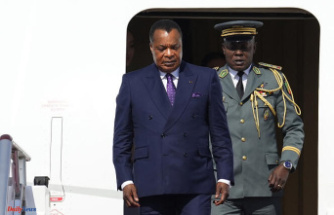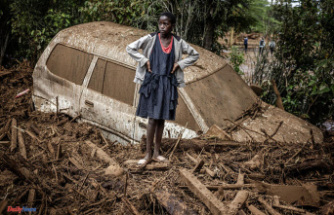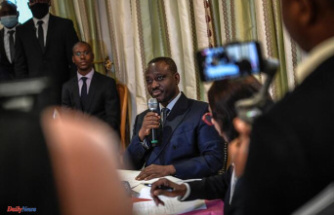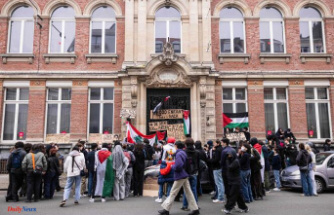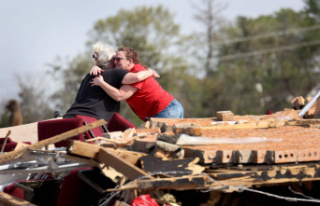The Great Hall of the People, the building used by the Government of the People's Republic of China for major occasions, will be the place where President Xi Jinping receives his Spanish counterpart this Friday with the honors reserved for high-level visits . Pedro Sánchez will also be the first European leader to land in Beijing after the Asian giant has taken a step forward to try to establish itself as the international mediator to end the war in Ukraine.
China's guest of honor is going to arrive at this meeting of "great political significance" for the moment in which it takes place - according to La Moncloa - with a very specific request: that it not hand over weapons to Russia. The scope of this message is framed in the context of the trip that the Chinese leader made to Moscow last week to meet with Vladimir Putin.
During that visit, Xi presented a peace plan for the war being waged in Ukraine and which, according to what the government points out, has points in common with the road map proposed by the Ukrainian president himself, Volodímir Zelenski. In particular, they highlight the reaffirmation of the principle of territorial integrity and sovereignty of all states, which in the eyes of the Spanish Executive would imply returning to the borders prior to the Russian annexation of the Donbas and Crimea regions in 2014; and the resounding rejection not only of the use of nuclear force, but even of the threat of doing so.
Before his meeting with Xi, at the Economic Forum in Boao (China), considered the Asian alternative to the one in Davos, Sánchez defended the need for the international community to have "responsible and constructive" leaders in the face of the current challenges to a "unprecedented scale" and, in particular, Russia's "brutal and illegal aggression against Ukraine, which is causing humanitarian, supply, insecurity, inflation and debt crises in a growing number of vulnerable countries."
The Spanish president has praised the fact that the authorities in Beijing have intensified diplomatic contacts with officials from other countries that reflect a "high degree of responsibility" to which he wants to "contribute". "Our points of view may be different in some areas, but we must continue to build bridges and increase our mutual trust," Sánchez stressed.
During his speech before a crowded audience, the Spanish leader explained that in the last week he has met with 40 leaders from three continents and that in all the conversations he has held the common denominator of "a desire for peace, stability and prosperity." As he has argued, "nobody wants there to be economic fragmentation or war."
Sánchez made these statements at the forum chaired by UN Secretary Ban Ki-moon, which is being held until this Friday on the island of Hainan, in the south of the country, with more than 2,000 representatives from 40 countries, including the Chinese prime minister. , Li Qiang.
Beyond the specific content of the Beijing peace plan, in the Sánchez Executive they value very positively that China has abandoned its "passive position" regarding the conflict to assume a leading role and actively participate in the search for solutions, as the Spanish president had requested in the bilateral meeting he held at the G-20 Summit in Bali last November. They consider that its capacity as a world power is essential to end a war with a devastating impact on a global scale and they especially highlight the influence it can exert on Vladimir Putin to convince him to abandon his offensive actions in Ukraine.
Even so, they also underline their differences with the Chinese approach to the conflict, in which they understand that both the aggressor and the attacked country are placed on an equal footing. In this sense, the sources consulted highlight that both the position of Spain and that of the rest of the countries of the European Union has been from the beginning of unwavering support for Ukraine as the victim of an invasion by Russia that has violated its borders. internationally recognized, a vision that will be shared during the official visit to Beijing this Friday.
In La Moncloa they assume that the war can be prolonged for at least the remainder of the year and into 2024 and express their firm commitment to continue supporting Zelenski, both with the training of soldiers and with new arms shipments beyond the six tanks Leopard engaged. "Whatever it takes," state government sources, who do not rule out that even this aid could translate into combat planes, as the Ukrainian president requested of Sánchez during his visit to Kiev a month ago.
The condition that the Spanish leader is going to propose to Xi to try to find a way out of the conflict is that Ukraine itself decides the conditions that must be met in order to sit down at a negotiating table and accept a ceasefire or any another proposed solution. They also stress that it is very important that he hold a meeting with Zelenski as soon as possible, with whom, unlike Putin, he has not met.
The approach that is made from Madrid is that China is coming out of a stage of political and diplomatic isolation after its border closure for three years as a result of the Covid pandemic, that it has to rebuild its international image and that, in addition, it is essential to participate in the search for solutions to global problems that without their involvement would not be possible to solve, regardless of the reasons for which they decide to do so.
Sánchez arrives in China today after meeting with more than 40 world leaders in just seven days. On Thursday and Friday of last week, he attended the European Council in Brussels, from where he later flew to Santo Domingo to attend the Ibero-American Summit, which was attended by 13 heads of state and as many representatives of delegations from countries of the zone.
This visit by the Spanish president to Beijing follows that of his German counterpart, Olaf Scholz, and that of the President of the European Council, Charles Michel. Next week is also scheduled for the French president, Emmanuel Macron, with the president of the European Commission, Ursula von der Leyen, and later that of the Italian prime minister, Georgia Meloni, although without a date at the moment, and probably the of the High Representative of the European Union for Foreign Affairs, Josep Borrell.
Although Sánchez is attending his two-day tour of China that begins today as the representative of Spain and under the umbrella of the celebration of the 50th anniversary of the beginning of diplomatic relations between the two countries, the visit occurs three months after the Spanish leader assumes the rotating Presidency of the European Union until the end of the year. In addition, in his team they specify that the position of the 27 regarding the Russian invasion has been coordinated and joint from the beginning and that in this sense the messages that will be conveyed will be very clear.
Beyond trying to cooperate to seek an end to the war in Ukraine and to strengthen their bilateral diplomatic relations, the visit of the Spanish delegation to Beijing will also have a strategic dimension of finding solutions to the challenges faced by the international community, such as energy supply. In this context, it will be argued that Europe needs autonomy and reduce the dependencies that make it vulnerable, not because the Asian giant is considered an enemy, but because, given the recent experience of the effects of a pandemic and product shortages, it is forced to to react.
In addition, the Sánchez government will try to reduce the asymmetry of its trade balance with China, with a permanent deficit between imports and exports, with the aim of minimizing tariff barriers and facilitating the participation of companies in the country's public tenders. Finally, it will try to relaunch Spain as a tourist destination for a market with high purchasing power that was interrupted by the Covid health crisis and to which Beijing gave the green light again on March 15, once again authorizing group travel to Madrid.
According to the criteria of The Trust Project

